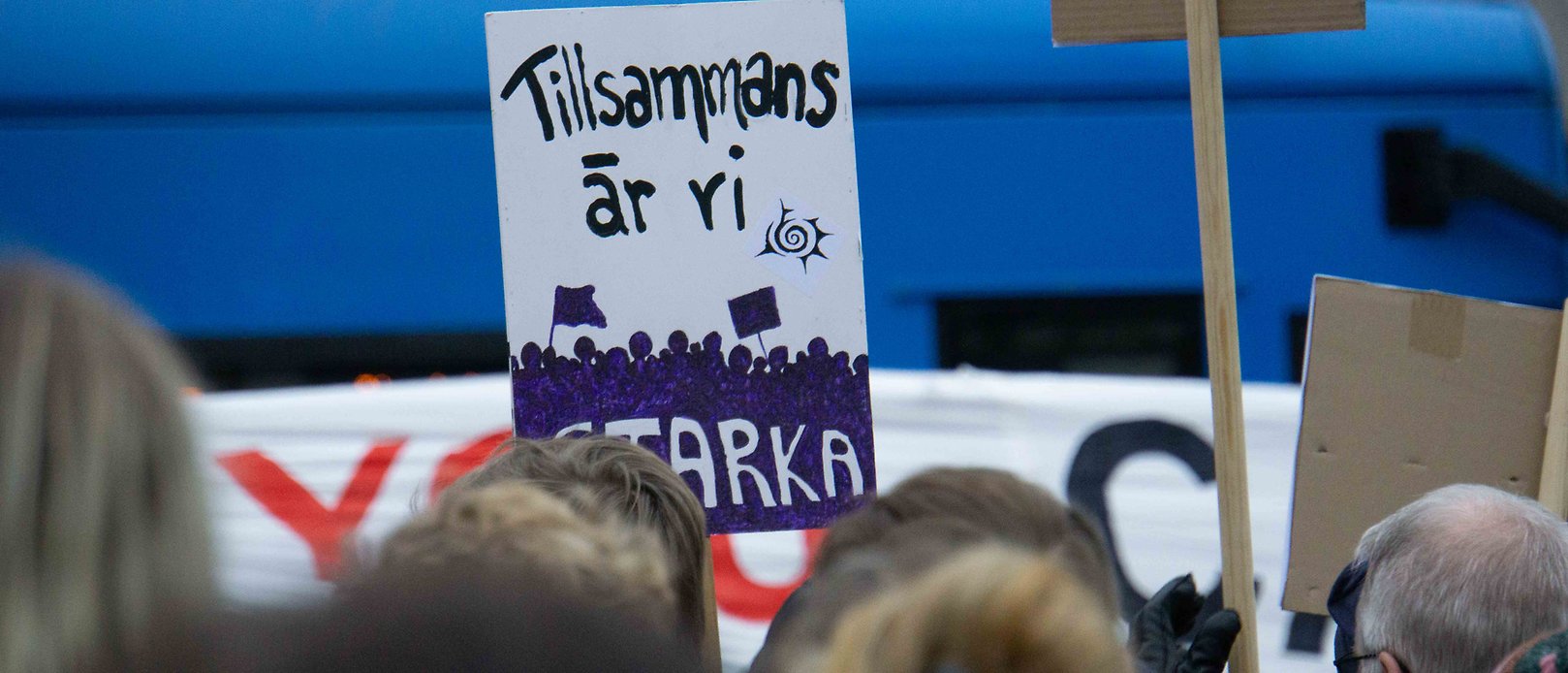ENABLING CHANGE
Civil society could be the gamechanger for climate policymaking

During a rally in Stockholm a protester carries a sign that says "Together, we are strong". Photo: Johannes Ernstberger
To make climate policies fair and effective we need to harness the power of civil society, argues centre researcher Thomas Hahn
- Issues of fairness and equity have been neglected in Swedish climate policymaking
- Civil society is in a very good position to discuss what equitable policies are
- There is enough evidence to support comprehensive climate policies that are much more progressive than what we have today
Is your trade union involved in creating climate policy? Probably not. But according to Thomas Hahn, who leads the Fairtrans project, it should be.
Fairtrans is a research programme designed to promote transformations to a fair and fossil free future in Sweden. In collaboration with trade unions and other large Swedish popular movements and civil society organisations Fairtrans will design roadmaps for Sweden to stay within the remaining carbon budget of the Paris Agreement.
We spoke to him about the projects potential to create better Swedish climate policies by combining the bright minds of researchers and grassroot movements.
Thomas, why is the civil society important for climate policymaking?
If we’re looking at the Swedish context: The country’s democracy is to a large extent built on grassroot movements, but few of them are active in shaping climate policies.
This is where Fairtrans comes in. Our aim is to catalyse action and engagement, so that civil society can be a force for climate policy and action. We collaborate with the large trade union confederations in Sweden as well as grassroot organisations for tenants, rural inhabitants and nature conservation, which together with their members represent almost half of the Swedish population.
Up until now, issues of fairness and equity have been terribly neglected in Swedish climate policymaking.
Thomas Hahn, project leader for Fairtrans
Trade unions are of strategic importance, but they have been left behind in the climate debate. That’s a problem because climate policies today focus exclusively on industrial development. Up until now, issues of fairness and equity have been terribly neglected in Swedish climate policymaking.
We, as researchers in the programme, have an advantage of discussing effective policies with a social-ecological lens. It helps consider large and complex system dynamics that play out in society and on the planet. Civil society, on the other hand, are in a great position to discuss what constitutes equitable policies. So, what we need is a co-production of knowledge between researchers and civil society, to better determine what fair means, when translated to climate policy.
How does this co-production look like within the project?
One of our most important outputs will be a manifesto. We work towards it very systematically: We host workshops with our programme partners to discuss and better understand fundamental issues that will need to be part of the manifesto.
The whole process is a collaborative effort of building trust and fostering knowledge from multiple perspectives. Our theory of change is that if these organisations are part of co-creating the knowledge that is foundational to the manifesto, they are more likely to support it over time, because they have confidence in the process. As researchers in this process, our role is to guide civil society in scientific consensus available, and share our knowledge about how climate science affects various climate policies.
The whole process is a collaborative effort of trust and knowledge building.
Thomas Hahn, project leader for Fairtrans
The aim of the co-production process is to better understand what people want, when discussed in the context of climate facts. The manifesto will be based on this co-created messaging and conveyed to politicians.
Our hope is that our programme partners, including the large trade union confederations, will support the fact-based manifesto. It would be an achievement of historical impact.
What obstacles are there?
For very large organisations it is oftentimes very difficult to agree on any policies whatsoever. The statements they manage to agree on are not controversial. There is also a common misconception that climate policy is contested.
But in climate policy recommendations there is indeed a high degree of scientific agreement, with different degrees of confidence: well-established or established but incomplete. This is when scientists agree on recommendations for policy, regardless of their political standpoint. And all Fairtrans partners agree that policy should be fact-based.
Do you think it will be possible to get these organisations onboard?
I’ve been getting more optimistic lately talking to the large trade unions. What we have found is that they will accept even quite progressive statements, as long as they feel confident that they are based on well-established knowledge.
There is enough scientific evidence to support comprehensive climate policy which is much more progressive than what we have today in the EU and in the rest of the world, so I am looking forward to having trustful and fact-based discussions on climate policy, with representatives of both trade unions and environmental NGOs.
Now, you’re going to the Gothenburg book fair which starts this week. Why?
Climate crisis is the largest theme of the book fair this year. For us this is a good opportunity to have dialogues with the public around climate policies.
Unfortunately, the book fair comes just after the Swedish elections. It would have been a much-needed opportunity to talk about the climate crisis which was not discussed much during the political campaigns.

Thomas Hahn is Associate Professor in environmental social science, specialised in ecological economics. His research focuses on ecological and institutional economics in relation to ecosystem services, climate action, sustainability transformation, post-growth economy, and adaptive governance of social-ecological systems.
Thomas Hahn leads a large collaborative research program for climate action and transformation with civil society organisations (FAIRTRANS)








